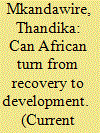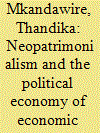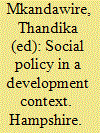|
|
|
Sort Order |
|
|
|
Items / Page
|
|
|
|
|
|
|
| Srl | Item |
| 1 |
ID:
130214


|
|
|
|
|
| Publication |
2014.
|
| Summary/Abstract |
During the last decade or so, Africa, once labeled by the Economist as the "Hopeless Continent," has been rebranded by the same magazine as "Africa Rising." Described by then-British Prime Minister Tony lair in 2001 as "a scar on our consciences," Africa has become the home of "roaring lions" and the "fastest billion"- contrasting with the image of the world's most impoverished "bottom billion," in the words of the economist Paul Collier. These new monikers and the ebullient optimism they reflect are a welcome hange. They have replaced a costly "Afropessimism" that reigned in Western media and academic circles during much of the 1980s and 1990s. The costs of the negative stereotypes of that period were felt not only in terms of Africa's selfesteem but also financially: They depicted Africa as economically much riskier than it ever was and dampened the animal spirits of investors.
|
|
|
|
|
|
|
|
|
|
|
|
|
|
|
|
| 2 |
ID:
139924


|
|
|
|
|
| Summary/Abstract |
During the past two decades, neopatrimonialism has become the convenient, all purpose, and ubiquitous moniker for African governance. The school of thought behind this research program, which the author refers to as the neopatrimonialism school, has produced an impressive literature on Africa. Its analysis informs policymakers and its language permeates media reportage on African states. While neopatrimonialism has long been a focus of development studies, in recent times it has assumed politically and economically exigent status. The school identifies causal links between neopatrimonialism and economic performance, and makes predictions drawing from what is referred to as the "logic of neopatrimonialism." Neopatrimonialism is said to account for trade policies, hyperinflation, economic stagnation, low investment in infrastructure, urban bias, andultimately, the lack of economic development in Africa. This article examines the empirical basis of predictions and policy prescriptions. It argues that while descriptive of the social practices of the states and individuals that occupy different positions within African societies, the concept of neopatrimonialism has little analytical content and no predictive value with respect to economic policy and performance.
|
|
|
|
|
|
|
|
|
|
|
|
|
|
|
|
| 3 |
ID:
058892


|
|
|
|
|
| Publication |
Hampshire, Palgrave Macmillan, 2004.
|
| Description |
xiii, 354p.
|
| Standard Number |
1403936617
|
|
|
|
|
|
|
|
|
|
|
|
Copies: C:1/I:0,R:0,Q:0
Circulation
| Accession# | Call# | Current Location | Status | Policy | Location |
| 049171 | 361.61/MKA 049171 | Main | On Shelf | General | |
|
|
|
|
|
|
|
|
|